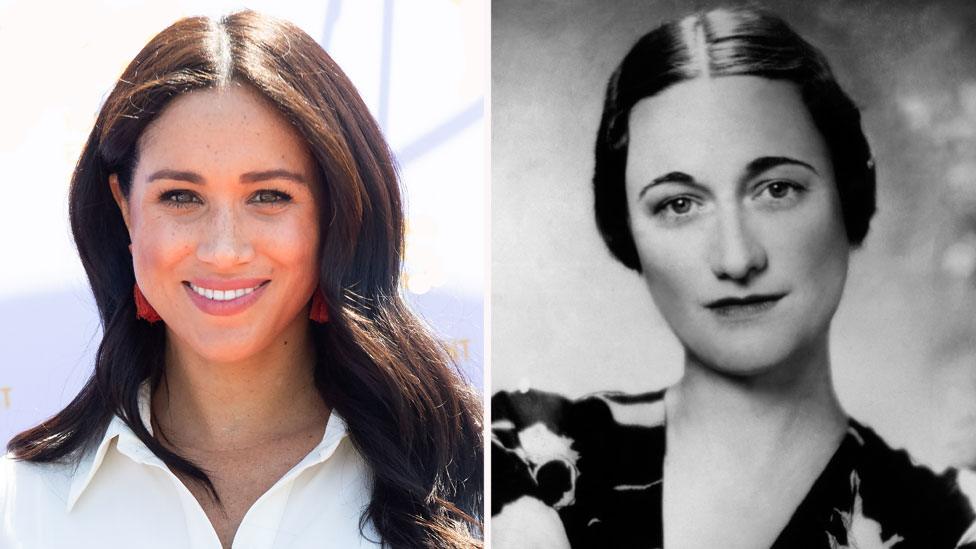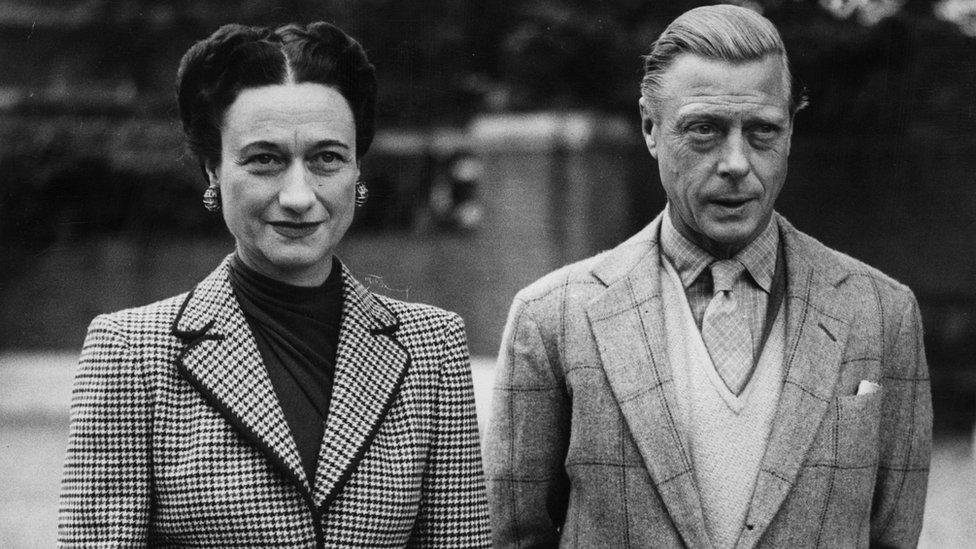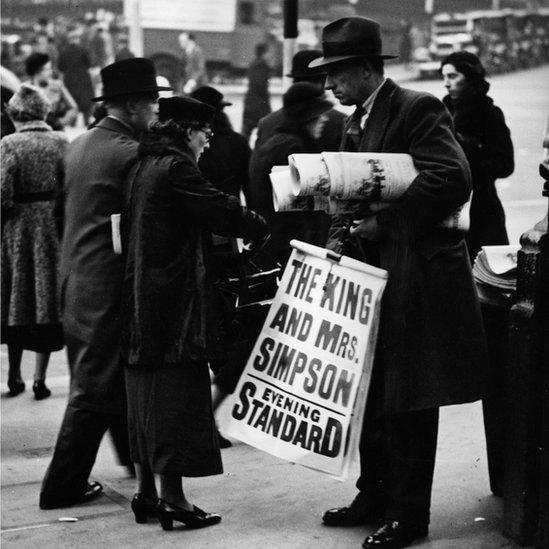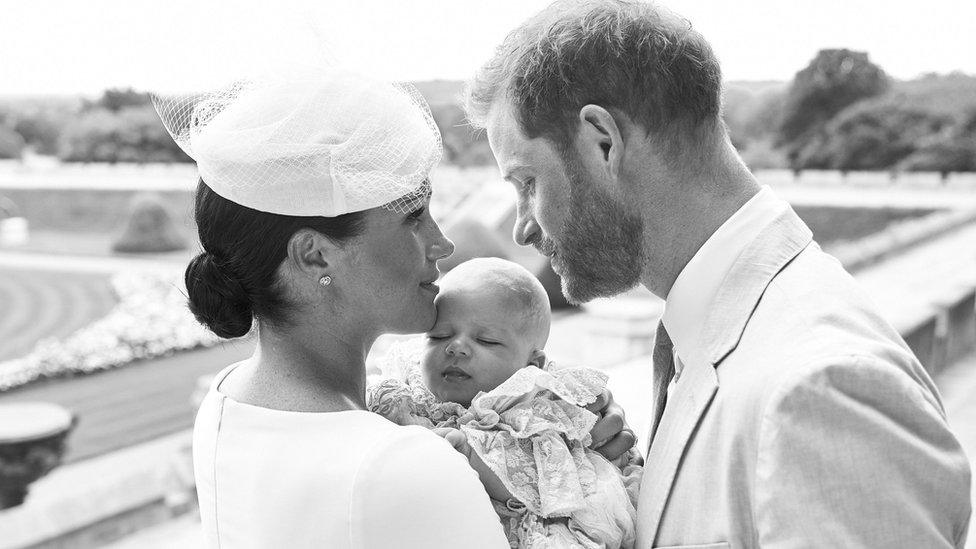Wallis Simpson's hard lessons for Harry and Meghan
- Published

A popular, playful prince falls in love with a strong-willed US divorcee, who ends up vilified by a hostile British press. In Harry and Meghan, some royal watchers see echoes of Edward VIII and Wallis Simpson, the couple at the heart of the abdication crisis eight decades ago. But does the comparison hold up? It could do if the Duke and Duchess of Sussex end up reliving the Duke and Duchess of Windsor's unhappy exile.
In December 1936, The King gave up his throne and an Empire of half a billion souls so he could wed a woman who was divorcing her second husband.
The public vitriol spewed on his bride-to-be, Wallis Simpson, might strike a chord with the latest American to marry into Britain's royal family.
On top of being condemned as a social climber from a Baltimore, Maryland, row-house, Simpson was reviled as a cheap adventuress, a lesbian, a nymphomaniac, a Nazi spy and a hermaphrodite.
She was portrayed as a sexual enchantress who supposedly learned "ancient Chinese skills" in the brothels of Shanghai, where her first husband, a US Navy pilot, had been stationed.
But the media's attacks on Simpson weren't just in print.
Daily Express reporters hurled bricks through the window of her rented Regent's Park, London, home, the newspaper's owner, Lord Beaverbrook, would later acknowledge.
As the abdication crisis loomed, Simpson fled to France, pursued across the country by reporters to Cannes.
She evaded this "ravenous besieging army", as she described them, in car chases and sometimes by crawling through bathroom windows.

Edward and Wallis became increasingly bitter
Anne Sebba, author of That Woman, the Life of Wallis Simpson, says Harry and Meghan's decision to step back from royal duties is nowhere near as constitutionally seismic given that Simpson was accused of almost destroying the British monarchy and Empire.
Sebba tells the BBC: "We're not living in 1936 when people were terrified about divorced women.
"They thought it was going to herald a wicked society where everyone would get divorced.
"But the really big difference is that Edward was King and Harry is sixth in line to the throne - he's never going to be King."
Simpson received sack-loads of hate mail, much of it misogynistic.
She wrote in her memoirs: "There can be few expletives applicable to my sex that were missing from my morning tray."

Read all about it: News of the abdication sent shockwaves far beyond Britain
But some of the strongest invective came from other women.
According to Hugo Vickers' biography, Behind Closed Doors, the Tragic, Untold Story of Wallis Simpson, the Queen once said: "The two people who have caused me the most trouble in my life are Wallis Simpson and Hitler."
Continuing that theme, Simpson's childhood friend, Mary Kirk, who married the royal consort's cuckolded second husband, Ernest Simpson, wrote in a diary of her erstwhile love rival: "I think of her as people think of Hitler, an evil force… full of animal cunning".
Princess Margaret referred to her uncle's lover as "that ghastly woman".
The popular narrative endures that Edward - as has been said of Harry - was a wimp manipulated by an ambitious and demanding lover.
But despite Simpson's reputation as "the woman who stole the King", Edward had always found royal duties unbearably tedious.
Like Meghan and Harry, he dreamt of escaping to live in Canada.
What would Canadians think about welcoming the royal couple?
Alan "Tommy" Lascelles, his assistant private secretary, said he realised after a long conversation with the prince in 1927 that "words like 'decency', 'honesty', 'duty', 'dignity' and so on meant absolutely nothing to him".
The royal consigliere concluded Edward was "an archangel ruined".
As Harry and Meghan steer a new course, they will no doubt seek to avoid drifting into the sort of aimless existence led by the Duke and Duchess of Windsor.
Aside from Edward's wartime spell as governor of the Bahamas, neither he nor his wife ever worked again.
Olivette Otele, Britain's first female black history professor, points out that while Meghan has been a successful actress, activist and lifestyle blogger, Simpson never had a job in her life.
"One was a socialite," says the University of Bristol lecturer, "and the other is an independent, successful woman who has relied on her own income to make a living."
Prof Otele says "the veiled and overt racist attacks" against the Duchess of Sussex, who is mixed race, are another reason why it is "completely nonsensical" to draw parallels between the two.
"Wallis Simpson, of course she was mistreated by the British press," says Prof Otele, "but it was never to the same extent [as Meghan]."
Black British women on Meghan and race
A miniature court in exile surrounded by emblems of royalty, Edward and Wallis spent the rest of their lives sponging off wealthy friends.
Like Harry and Meghan, Edward and Wallis hobnobbed with Hollywood royalty, hosting movie stars such as Richard Burton and Marlene Dietrich at their French country retreat.
Edward had little to do other than play golf. He professed no regrets about his 11-month reign, though his stories too often began with the words: "When I was King..."
He blamed everyone but himself for his abdication, from Prime Minister Stanley Baldwin to the Queen Mother.
"Twenty years I worked for my country and they kicked me out on my ass," the embittered duke told a friend.
Perhaps the greatest irony of all for the so-called fairytale romance of the century is that most biographers agree that Edward had cast aside his crown for a woman who did not even really love him.

Archie was christened in a private ceremony, from which the press and the public were excluded
On the Windsors' long evenings together, whisky would be served after dinner and "they had nothing to say to each other so the contents of the decanter just went slowly down, down, down", recalled their private secretary, John Utter.
According to Andrew Morton's book Wallis in Love, Simpson's heart actually belonged to her friend, Herman Rodgers, a wealthy Yale graduate.
The duchess is said to have made this stunning confession to Rodgers' second wife on their wedding day in 1950.
The Windsors were also peeved by their fading fame.
Charles Pick, publisher of the duchess' 1956 memoirs The Heart Has Its Reasons, said that when they first met to discuss her book Simpson rose from a chaise longue to complain about being pushed off the newspaper front pages by Marilyn Monroe.
In 1966 the duke and duchess took a train to Vienna, Austria, and grumbled about the paparazzi they expected to find lurking at their destination.
But an aide noticed they could not hide their disappointment when no photographers materialised.
As Harry and Meghan embrace a kind of semi-exile, they might do well to bear in mind some words of advice from Shakespeare.
In Henry IV, Part I, the king rebukes his son, Prince Harry, for shirking his duty and suggests he has "mingled his royalty with cap'ring fools".
"For thou has lost thy princely privilege," the monarch berates his heir. "Not an eye / But is aweary of thy common sight."
Follow @judesheerin, external
The couple exchanged vows and rings before the Queen and 600 guests at St George's Chapel